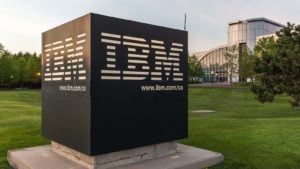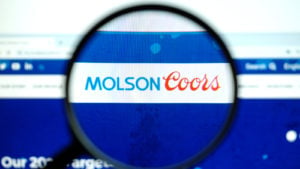At the same time, some economic figures continue to impress, with unemployment still below 4% and GDP growth coming in at a robust 4.9%. These numbers don’t usually signal that a recession is knocking at the door. So, while we may not know precisely what the future holds, adding some secure long-term dividend stocks to your portfolio seems like a smart hedge against potential volatility.
So, if you find yourself also straddling optimism and skepticism about markets right now, you’ll want stocks that deliver steady payouts with upside earnings potential, cushioning your portfolio whether or not a downturn hits. Here are seven to look into.
Flowers Foods (FLO)

Flowers Foods (NYSE:FLO) has been a staple in American households for decades, producing market-leading baked goods under brands like Nature’s Own, Dave’s Killer Bread, and Wonder. However, the stock has broken its two-decade growth trajectory in the latest downturn in retail stocks, losing around a quarter of its market capitalization. In my view, this selloff is overdone, and the stock is poised to bounce back in the coming years, as this business has been historically very profitable, and recent headwinds should not incur such a drastic decline.
Flower Foods has consistently delivered steady top-line growth and enviable margins over the years. Naturally, even the best businesses go through temporary setbacks, and Flowers Foods is no exception. Supply chain disruptions, inflationary pressures, and some loss of low-margin business have created obstacles in the near term.
Of course, these are industry-wide issues that most food producers have had to navigate. With that said, Flowers Foods boasts an impressive track record of resilience, and there is little evidence to suggest the company has lost the competitive edge that has propelled stable market share gains decade after decade.
Therefore, buying FLO stock near the trough right now could provide a substantial upside. The company’s dividend yield is 4.4%, rising for 22 consecutive years, providing investors with income while they wait for market sentiment to shift. I believe the long-term picture remains bright for this leading baked goods purveyor and its loyal customer base. This is an opportune time for value investors to grab shares at a bargain.
International Business Machines (IBM)

Investors usually avoid discussing tech stocks when considering recession-resistant ideas, but International Business Machines (NYSE:IBM) strikes me as a compelling exception. IBM enjoys unparalleled competitive advantages in its space. These include: an enormous patent portfolio, world-class research capabilities, long-standing customer relationships across industries, and a steady cash cow legacy business in mainframe computers and infrastructure services.
Of course, IBM does face some uncertainty regarding the potential impact of broader economic struggles on IT spending and hybrid cloud adoption. However, Big Blue boasts an incredibly loyal customer base of leading global enterprises and government agencies that rely heavily on its mission-critical solutions. These sticky, lucrative customer relationships provide durable sources of recurring revenue even during economic stress. IBM is also going through a transition into high-growth segments like artificial intelligence, hybrid cloud services, and quantum computing. In fact, IBM stands as the clear frontrunner in quantum computing today. My position is that as silicon chips continue to shrink and Moore’s Law slows, Wall Street will eventually grasp the immense opportunities in quantum computing, which utilizes subatomic particle behavior to enable exponential leaps in computational power.
By my math, if IBM captures even a tiny slice of the vast potential end markets for quantum computing technology over the next 10 to 20 years, its currently depressed valuation of around $142 billion could expand dramatically. With a rock-solid 4.3% dividend yield to collect while shares ride this wave, I believe IBM offers a compelling risk-reward setup at current levels. Call me an optimist, but I see realistic potential for triple-digit percentage gains this decade as quantum computing moves toward commercial viability. For conservative investors, it may be wise to safeguard against near-term volatility, but the long-term picture looks bright in IBM’s favor, in my view.
Dollar General (DG)

It is no secret that inflation, inventory gluts, and slowing consumer demand have hampered retail broadly over the past year. Naturally, discount chain Dollar General (NYSE:DG) has not been immune to the reckoning. In fact, DG stock has endured a 51% plunge from all-time highs as shrinkage weighs on margins. Comps were nearly flat as well. Of course, these realities disappoint shareholders after years of steady growth.
However, Dollar General’s brutal selloff appears overextended, given its historically-consistent operational perfromance and stellar long-term record. In essence, Mr. Market seems to have thrown the baby out with the bathwater here. Dollar General remains a tier-one operator with immense opportunities still ahead to extend its commanding market leadership.
Make no mistake: the company’s near-term outlook warrants caution. But with shares beaten down so severely, much of the negativity appears to have already been priced in. Personally, I would argue Dollar General has likely bottomed and offers a wide margin of safety at 7-times earnings. Once inflationary pressures abate and consumers regain firmer financial footing, DG looks positioned to rebound sharply.
The stock’s reliable dividend yield of 1.9% adds income during the wait. Of course, headwinds persist, and further volatility is probable. Still, for investors with long time horizons, buying into leading enterprises like Dollar General near cyclical lows has proven quite rewarding historically. Therefore, I believe patience will be rewarded for those accumulating shares around $125 per share. I think DG stock may return to all-time highs above $260 within a few years as execution normalizes.
Target (TGT)

Like the above retailer, Target (NYSE:TGT) has endured its fair share of pain. As a result, TGT stock has been cut nearly in half from its 2021 peak. However, with the stock hovering near $130 per share, I think much of Target’s negativity has also been priced in.
In my eyes, the company’s current valuation bakes in recessionary conditions that simply do not match reality. U.S. consumers remain generally resilient, even if discretionary budgets face some trimming. Moreover, Target delivered a sizable third-quarter earnings beat, underscoring retained earnings power. Management expects headwinds to persist, but Target has a long record of adapting nimbly to shifting retail dynamics.
Therefore, I believe the sheer depth of Target’s decline has set the stage for substantial upside ahead. Valued at just 16-times forward earnings with a 3.3% dividend yield, TGT offers a compelling bargain at today’s deflated levels. The path back to prior $260 highs seems long, but I expect patient, long-term investors will be rewarded here. Target’s empire was not built in a day, and its resurgence may follow a similarly steady trajectory.
Booz Allen Hamilton (BAH)

In my experience, most tech-related stocks make poor defensive holdings, exposed to fickle consumer trends and turbulent end markets. Booz Allen Hamilton (NYSE:BAH) is a refreshing exception on all fronts. Above all, BAH enjoys unparalleled competitive advantages from its exclusive focus on fulfilling U.S. intelligence and defense consulting needs.
Once secured, Booz Allen’s contracts with various government bodies tend to renew in perpetuity, creating an ultra-sticky revenue base. The company boasts a $35 billion backlog, equivalent to over 2.5 years of revenue. Better still, BAH continues winning new awards at a healthy clip, setting fresh backlog records even amid geopolitical uncertainty.
Looking ahead, I expect intensifying global tensions will only heighten demand for intelligence services and technologies. So, while many fret about enterprise IT budgets, government IT spending appears more durable than ever, evidenced by Booz Allen’s 14.8% organic growth last quarter. With these tailwinds at its back, conservative investors can embrace BAH’s modest 1.5% dividend yield and reinvest.
Molson Coors Beverage Company (TAP)

Molson Coors Beverage Company (NYSE:TAP) seems to have a relatively boring profile at first glance. However, for investors focused on defensive exposure and income, few can match Molson Coors’ virtues. Trading at just 11-times forward earnings with a 2.7% dividend yield, Molson Coors is one of the best value stocks across consumer staples.
Admittedly, Molson’s mature brands lack eye-popping growth prospects. Consensus forecasts call for low-single-digit sales and earnings expansion looking out. Importantly, even modest volume gains coupled with a slight pricing upside should allow consistent free cash flow generation. In my book, steady, predictable cash flows always warrant above-average valuations, especially amid current market uncertainty.
With recession risks lingering and many pricier consumer names susceptible to demand swings, Molson Coors’ bargain-basement pricing and dependable payouts have become a safe haven. While the upside appears modest on an absolute basis, I believe buyers at current levels see a favorable risk-reward relationship with this stock right now, given Molson Coors’ underlying business stability and discounted multiples. Sometimes, slow and steady still wins the race.
Federal Agricultural Mortgage Corporation (AGM)

Unlike traditional lenders, the Federal Agricultural Mortgage Corporation (NYSE:AGM) holds a special federal charter to provide secondary market financing for rural infrastructure and agribusiness loans. Given AGM’s specialized purview and government backing, the name offers unique insulation against economic fluctuations. And with Wall Street fixated on interest rates and housing data of late, this differentiated value proposition has captivated investor interest.
Bolstered by hot agricultural and renewable energy lending markets, AGM is firing on all cylinders, poised to deliver over 37% earnings growth in 2023. Looking ahead, the fun has only just begun. Thanks to its outsized profits, AGM continues to accumulate capital to fund additional loan purchases down the road. As a result, analysts forecast earnings can still expand near 9% annually for years to come, on top of 7% projected yearly sales growth.
On the date of publication, Omor Ibne Ehsan did not have (either directly or indirectly) any positions in the securities mentioned in this article. The opinions expressed in this article are those of the writer, subject to the InvestorPlace.com Publishing Guidelines.
Omor Ibne Ehsan is a writer at InvestorPlace. He is a self-taught investor with a focus on growth and cyclical stocks that have strong fundamentals, value, and long-term potential. He also has an interest in high-risk, high-reward investments such as cryptocurrencies and penny stocks. You can follow him on LinkedIn.
